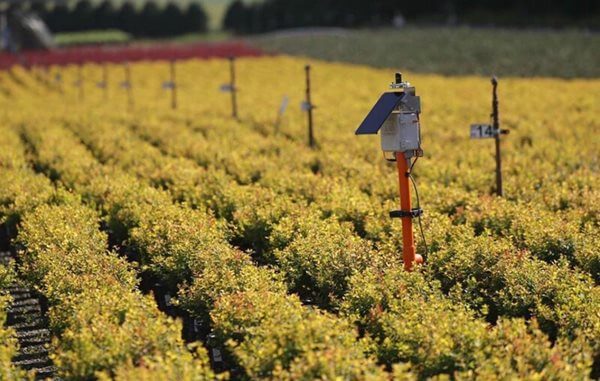In-Field Sensor Focus On Delivering Data, Not Decisions
Jun 05, 2020

June 4, 2020 01:17 PM - AGPRO
Three year old startup EarthScout aims to serve all types of growers—from row crops to indoor operations. Their cellular connected in-field sensors can deliver data for observation or parameters can be set for alerts to in-field conditions.
“What’s different about EarthScout is that we focus on what farmers want to measure rather than what they want to grow,” says the company’s chief operating officer Josh Krenz. “It’s not a crop-specific technology, and our platform allows farmers to own their data.”
EarthScout units come standard with one sensor to measure air temperature and humidity in addition they are built with four sensor ports to measure up to four of the following:
- Soil Probe
- Soil moisture
- Soil EC
- Soil Temperature
- Soil Oxygen Probe
- Soil Oxygen
- Soil CO2
- Solar Radiation Sensor
- Solar energy
- Air Sensor
- Air Oxygen
- Air CO2
- Frost Sensor
- Frost Temperature
“We’ve had a lot of success with growers in the Texas panhandle, California and other places where measuring water and stewarding irrigation resources is important,” Krenz says.
The company tested about 100 units last year, and 2020 will be its commercial launch year. One ag retailer testing the technology and its potential in the precision market is Central Farm Service, a cooperative in southern Minnesota.
Ashley Boehnke, a precision territory lead with Central Farm Service says it was one of their growers who first brought the EarthScout technology to their attention. Now, the co-op is expanding its testing of the probe technology in two dedicated plots in 2020 after success in 2019.
“This technology fits our precision ag program, Central Advantage, because we believe while there’s some good baselines you can derive from one year of data—you need multiple years to enhance your recommendations,” Boehnke explains.
She says the Central Advantage program creates a database of local agronomic data where participating farmers can learn from their own and each other’s agronomic decisions and practices to improve.
“Many technologies are telling growers what to do with their data. We don’t want to make recommendations. We want to provide local analytics to the let the grower or grower’s advisors make better decisions,” Krenz says.
EarthScout is also launching a new product in 2021, the Cub Scout, which extends the reach of an EarthScout unit. Up to 10 Cub Scout units can be wirelessly connected to an EarthScout unit as far away as two miles. The Cub Scouts are designed with a single port for a single sensor type.
The EarthScout interface displays:
- Real-time data & historical trends
- Growing degree units
- Alerts, notifications and helpful tools
- Journal for managing notes, tasks, soil test data, tissue sample data, photos, and more
- Links to crop specific reference materials
Outdoor units have an MSRP for $1995 to $2995 and the company also offers a monthly lease program. More information is available at: https://www.earthscout.com/
